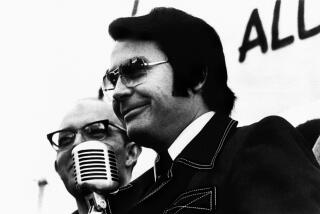An enemy held closer
- Share via
“SLEEPER CELL,” the Showtime series about eclectic jihadis loose in L.A., feels like forbidden fruit -- the only series on American television to address, in any direct way, post-9/11 religious expression in the context of Islam, post-9/11 “Invasion of the Body Snatchers” paranoia about Muslims and the more defensible post-9/11 security concerns about the reach of extremism.
The show isn’t brilliant, but it is audaciously alive -- suspenseful and probing, with just enough gratuitous sex and violence to remind you that you’re watching a pay cable channel. Islamic fundamentalism was the basis of a season-long plotline on “24” and is said to be a controlling metaphor on Sci Fi’s “Battlestar Galactica.” More typical was the two-hour episode of TNT’s “The Closer” last week, in which Brenda Johnson (Kyra Sedgwick) matched wits with a suspected member of the extremist group the Army of Allah. “I’m in America observing an empire on its deathbed,” he told her, “a tourist doing charitable work among the addicted and sexually diseased.”
For the record:
12:00 a.m. Dec. 20, 2006 For The Record
Los Angeles Times Wednesday December 20, 2006 Home Edition Main News Part A Page 2 National Desk 1 inches; 40 words Type of Material: Correction
‘Sleeper Cell’: The caption with a photo that ran with a review of the Showtime series “Sleeper Cell” in the Dec. 9 Calendar section identified the actor conducting an FBI interrogation as Scott Vance. The actor is Patrick St. Esprit.
He was blind and bronchial for extra poetic heaviness. “Sleeper Cell,” in this context, is something else: When the show debuted a year ago as a 10-hour miniseries, the jumping-off point seemed to be the titillating details of the 9/11 hijackers -- how they joined gyms, rented apartments and, rumor had it, went to strip clubs, blending into the fabric of consumer America.
The terrorists on “Sleeper Cell,” the second season of which begins Sunday, stray into temptation all the time: It’s the essential driving force of the show, their day-to-day hypocrisies. The first season ended with a foiled plot to blow up Dodger Stadium; by then, you had come to appreciate both the show’s strength (the powerful Oded Fehr as the purist cell leader Farik) and its weakness (the hello-is-his-microphone-on, low-talking Michael Ealy as the undercover FBI agent Darwyn, working the cell from the inside).
Season 2, which sprawls out around the globe and is apparently going to be about the making of a nuclear bomb, opens with Fehr being interrogated in U.S. custody and Darwyn on holiday with his girlfriend Gayle (Melissa Sagemiller). Two other team members died in the Dodger Stadium operation -- the son of the Berkeley philosophy professor and the angry Frenchman who drove a Hollywood tour bus, though the Bosnian Muslim hip-hop aficionado, Ilya (Henri Lubatti), escaped.
Ilya is now trying to make it to Canada with the girlfriend he picked up at Tower Records on Sunset (apparently closing at the time of their relationship), and they’re some kind of match.com heaven, given that she believes 9/11 was an American-run conspiracy, U.S. leaders in bunkers.
“Every time we have sex it’s like the ultimate ... to Bush, Cheney and the whole 9/11 plot,” she tells him, post-coital.
At that moment I might suggest we see other people, but “Sleeper Cell’s” creators, Ethan Reiff and Cyrus Voris, love to mix Western temptation and Islamic fealty -- the war on terror as that media-fueled image of Mohammed Atta getting a lap dance.
And I have to say I like the choices they’ve made this season in reassembling the cell. There’s a Dutch explosives expert and former Amsterdam call girl named Mina (Thekla Reuten); her cover is that she’s a nanny on the Westside. There’s a former Latino gangbanger named Benny (Kevin Alejandro) working in his parents’ Boyle Heights corner store and Salim (Omid Abtahi), the closeted gay son of “a prominent Baghdad family” who left Iraq during the Iran-Iraq War.
Is your Brentwood au pair Al Qaeda? Is the guy you hooked up with in the shower at Bally’s going to leave you for martyrdom?
No, seriously. In asking these questions, “Sleeper Cell” begs to be viewed as laughably preposterous, even as you find it anxiously thrilling. And the show airs at a time when the country is still seemingly enveloped in a fog about the cultures of the Middle East, despite the U.S. military occupation roiling the region.
No major cable or satellite provider chose to license Al Jazeera when the Middle East’s most popular 24-hour news network launched an English-language version last month. It’s either a blackout based on economics or politics or some intersection of both. Available on the Internet, Al Jazeera has the reputation here -- thanks to pithy commentary from outgoing Secretary of Defense Donald Rumsfeld -- as the TV arm of Osama bin Laden. But based on periodic viewing over the last several weeks, Al Jazeera International -- with studios in Doha, Qatar, Kuala Lumpur, London and Washington -- is not all that different from the BBC model of news, which is to say more global and somewhat more in-depth than the pace of broadcast news here.
On Dec. 1, for instance, fighting in the Mexican parliament led the newscast, which was followed later by the weekly program “Inside Iraq,” which offered video inside the Iraqi Health Ministry, site of a mass kidnapping last month.
A graphic on “Inside Iraq” that day estimated that more than 655,000 people in the country have been killed since the invasion, at a current rate of 120 a day. The figures were widely reported, though U.S. troop casualties, on a given day, are the numbers that get regular network play here.
In a more anecdotal example of a one-way cultural conversation that ill serves both sides, Jill Carroll, the Christian Science Monitor reporter held in Baghdad for three months earlier this year, found herself watching “Oprah” with her mujahedin captors, but now back in the States she can’t turn on her TV and access the Arab world’s most far-reaching news outlet.
Something like “Sleeper Cell” is hardly a steward of multiculturalism, but it does get at our cultural ignorance, as when Farik gives up a co-conspirator to the feds, which turns out to be the name of a Saudi pop star.
Should you have to Google during an interrogation? Darwyn’s a prison-converted Muslim, a beacon of peaceable Islam caught between extremes, both bureaucratic and idealistic -- loose networks of global jihad on the one hand and U.S. intelligence agencies on the other.
This season, Darwyn’s FBI minder (Jay R. Ferguson) is a churlish toady; their clandestine meetings take place in the VIP room of a strip club, where they have, essentially, the same conversation over and over. In these scenes, it is possible to mistake “Sleeper Cell” for ordinary, but quickly you’re whisked off to another front, and the episode kicks in anew.
As the cell operation turns to the procurement of a nuclear capability, Darwyn will take over the sleeper cell, provided everyone can hear his instructions, while the evil Farik is extradited to his native Saudi Arabia for more brutal treatment -- though their paths will cross as the season once again builds to maximum linear tautness, and you forget to wonder where, exactly, the line between the topical and the voyeuristic blurred.
*
*
‘Sleeper Cell: American Terror’
Where: Showtime
When: 9 p.m. daily, Sunday through Dec. 17
Rating: TV-MA (may be unsuitable for children under the age of 17)
More to Read
The complete guide to home viewing
Get Screen Gab for everything about the TV shows and streaming movies everyone’s talking about.
You may occasionally receive promotional content from the Los Angeles Times.






